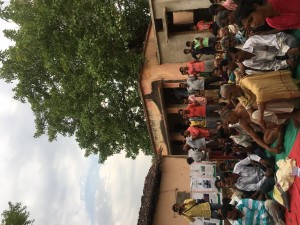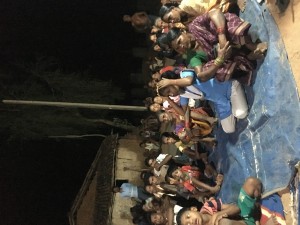Odisha Shodhyatra: Pervasive Poetry, widespread experiments, healthy children
There could not have been better start of second round of shodhyatras around the country. While waking from Baripali to Narsinghnath, Bargarh district, we met very vibrant, warm and curious communities-always willing to learn and ever keen to share. When did we find a poet in every other village. The land of late great poet Gangadhar Meher has been fertilised with his poetic legacy. A school teacher, Bhawani Prasad Padhan, Kansinghka village had made a group to select a poem every day, write it on a board in school and then share it with a whatsapp group. Large number of other villages would then have volunteers write the same poem on their respective black board in the village. Where have we seen love for poetry, language and culture so deep? I firmly believe that poetry sharpens our perceptions, deepens our empathy and erodes our inertia by making us a bit restless.
There was not a day when we did not come across an innovation. So much pervasive culture of curiosity, experimentation and innovation is evident in a few other places in the country. Educational quality in government schools was a cause of concern to many. Block Education Officer Radhakrishan Gartiya of Bejepur tried many innovations. He persuaded 18 school teachers to forego their summer vacation and instead teach children to help them overcome their inadequacy in different subjects. In some of these remedial classes there was 90 per cent attendance. If more and more teachers took such voluntary steps, supported by other well-wishers of government school children then we can help these kids compete with the rest of more privileged children and make market for merit more fair and efficient. He also encouraged school teachers to grow curry patta plant (Murraya koenigii) so that its leaves could be added in mid-day meal to enrich the diet of children.
More than 45 students (from IISc, IIMs, NITs and local university like VSSUT), farmers, artisans, teachers, and three President award winner innovators walked together in this extremely warm weather. Saving grace was that local village panchayat had put up drinking water point at several places on the way. In every village, women shared traditional food made of ragi, kodo millets, parboiled rice, mahua flowers. Many young people did express regret about the mahua liquor sale and addiction among elderly people. This was the only sore point we heard repeatedly. Mothers had taken care of their children very well. We did not find a single malnourished child on the way and secret seemed to be breastfeeding infants upto five years. Today when young mothers seem to wean children after six months itself, this is a message worth pandering over. In Mahendragarh, Anantnag Districts, also we had noticed similar practice among mothers.
Ahimsa society, Baripali had poled 130 traditional paddy varieties and 80 vegetable varieties. They had received national award for such a good conservation effort. Chetan Patel, coordinator of educational innovations and shodhyatra at SRISTI had made a huge effort to locate innovators along with volunteers like Dr Balaram Sahu, regional collaborator, Dr Vivek Kumar and many others from National Innovation Foundation regional cell, Umesh, Raut, Little angel school teachers, VSSUT students. Many shodhyatris may not realise how much effort was put in by SRISTI team in advance. The real fruit of this labour is when so many unsung heroes of the area get recognition. A region known for extreme poverty was so rich in culture, art, weaving( more on this very unique double ikkat tradition in next issue), biodiversity and local knowledge systems as may not be apparent to many. Water is indeed scarce in majority of this rainfed region. Not surprisingly, many children also suggested need of designing innovative water filters. I will share more ideas of children, stories of innovations in handloom spools, spinning wheels, and welding machines besides traditional knowledge next week. If only the developmental models build upon the resources in which poor people are rich not leverage what only they lack, there will be a cultural revolution in the country. I am very happy that when we met the Chief Minister along with senior secretaries of the state government, he quickly appreciated the need for recognsiing the innovators in education, institutions, technology and culture-four pillars of the Honey Bee Network. Odisha may not only organise Festival of Innovation at state level but also help such creative people get attention under start-up policies through in situ incubation policy for setting up social and economic enterprises. May be other states will also innovate in this direction.


